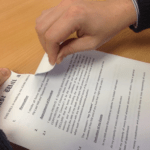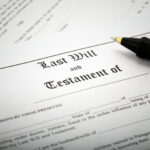Blog
Understanding Real Estate vs Real Property in New Jersey

Real property can be confused with both personal property and real estate, none of which mean quite the same thing. To learn more about these differences, keep reading. Understanding Real Property While terms like “real property”, “personal property”, “real estate”, and even “land” can all be used in similar contexts, understanding their differences is important. […]
Read More....Vehicles and the Probate Process in New Jersey

When drafting your Will and contemplating the probate process, it is good to know your options when it comes to vehicles you own. A car is considered personal property and will normally need to go through the probate process in order to be transferred to the person named in the Will. However, if you are […]
Read More....The Camp Lejeune Justice Act Signed Into Law

The Camp Lejeune Justice Act was finally signed into law this past month, giving those who may have been affected by the contaminated water at the camp a chance to achieve justice and compensation for the severe medical damages resulting from the contaminated water supply. Camp Lejeune was a United States Military training facility in […]
Read More....Supreme Court of New Jersey Says the Three-Day Attorney Review Period Does Not Apply to a Real Estate Auction

In 2016, Mengxi Liu participated in a real estate auction where she bid $1.1 million for a property owned by Max Spann Real Estate. Liu subsequently made a deposit on the property in the amount of $121,000. Unfortunately, Liu was not able to consummate the sale after making the deposit and Spann refused to return […]
Read More....Did You Actually Read Your Home Improvement Contract?

Doing some home improvement to your home, your shore house, or investment property can be exciting. You have a vision, a good contractor, and you’re eager to get started. However, it’s important to take your time with the home improvement contract. Be sure that it is thorough, clear, and includes all necessary items before you […]
Read More....Revoke a Will in New Jersey

When you revoke a will you void the previous will, this mainly happens when the old will no longer serves a purpose to your current situation. There are many instances in which a Will drafted at an earlier time in life is no longer applicable to you and the people in your life. When this […]
Read More....What are the Requirements for a Valid Will in New Jersey?

When drafting your Last Will and Testament, it is important to know what steps must be taken in order for you to have a valid will. There are several requirements to discuss, and by taking them into consideration while you are drafting your Will, it is more likely that it will be considered valid by […]
Read More....How to Address Your Funeral Arrangements as Part of Estate Planning in New Jersey

When addressing your funeral arrangements it can be easy to disregard certain elements of estate planning when you’re giving attention to seemingly more important items like what will happen to your property and other assets after you’re gone. However, considering your own funeral arrangements is an important step that can ensure your wishes are met, […]
Read More....Determining and Paying the Debts of an Estate in New Jersey

Determining and paying the debts of the decedent and ensuring they are paid is one of the most important steps in the probate process. Along with marshaling the decedent’s assets, their debts must also be marshaled in order to account for any unpaid loans, medical bills, credit card bills, or other types of debt. Who […]
Read More....Amending or Revising a Will in New Jersey – The Codicil

Amending or Revising a Will and Testament can take a lot of time, money, and energy. Codicils are an alternative. Consider a codicil as an amendment to your Will if you do not want to re-write the entire document. There are a few things to consider, however. What is a Codicil? A codicil is a […]
Read More....